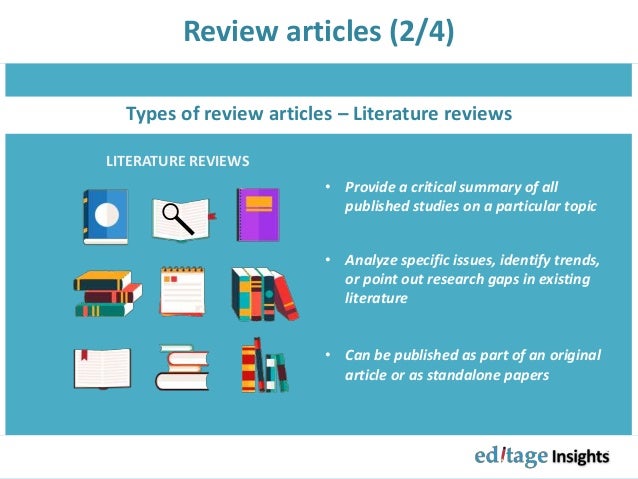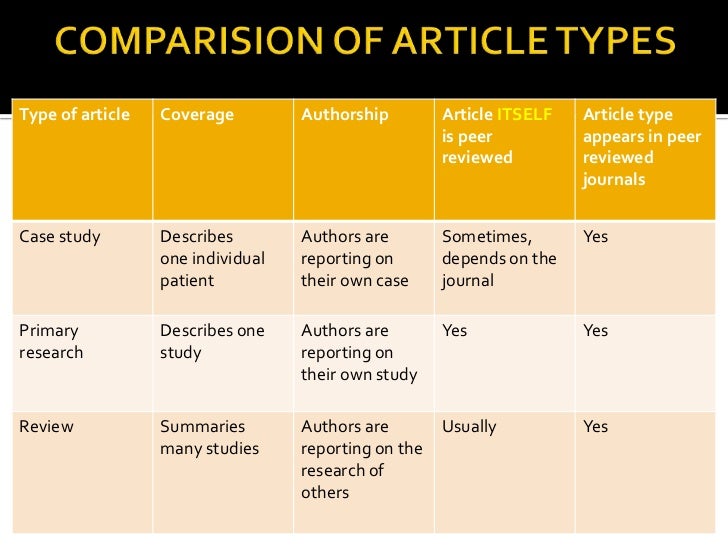
Feb 22, · Here is a list of different types of scholarly articles.. original research (empirical) article. based on an experiment or study. This type of article will have a methodology section that tells how the experiment was set up and conducted, a results or discussion section, and usually a conclusion blogger.com: Elizabeth Salmon Oct 21, · There are three main types of articles review that you can be asked to write during a college course: Narrative. This type requires studying the author's experience. The expert's theories and methods have to be analyzed and compared. The key to writing a successful narrative review is to provide qualitative and logical arguments. Evidence 16 rows · Mar 30, · Systematic search and review. Combines strengths of critical review with a comprehensive search process. Typically addresses broad questions to produce ‘best evidence synthesis’. Aims for exhaustive, comprehensive searching. May or may not include quality assessment. Minimal narrative, tabular summary of blogger.com: Sarah Cantrell
Home - Systematic Reviews: the process - LibGuides at Duke University Medical Center
A systematic review attempts to collate all empirical evidence that fits pre-specified eligibility criteria in order to answer a specific research question.
Systematic reviews should be carried out according to a predefined protocol that sets out the scope of the systematic review and details of the methodology to be used throughout the review. This guide is intended for systematic review help. For an overview of project planning, see the guide: Project Planning for the Beginner: Home.
Systematic reviews can evaluate a range of evidence; qualitative, quantitative or both. Appropriate methods of synthesis should be used for different types of evidence. The systematic review process has been developed to minimize bias and ensure transparency.
Methods should be adequately documented so that they can be replicated. When conducted welldifferent types of review articles, systematic reviews should give us the best possible estimate of any true effect. An assessment of the methodological quality of reviews should highlight the limitations of a review. Understanding and interpreting research evidence is an important part of practicing evidence-informed public health. This short video from the National Collaborating Centre for Methods and Tools explains the types of reviews and what kind are needed.
Time : On average, systematic reviews require 18 months of preparation. A team: A systematic review can't be done alone! You need to work with subject experts to clarify issues related to the topic; librarians to develop comprehensive search strategies and identify appropriate databases; reviewers to screen abstracts and read the full text; a statistician who can assist with data analysis; and a project leader to coordinate and write the final report.
A clearly defined question : Clarify the key question s of you systematic review and the rationale for each question. Different types of review articles the PICO framework to identify key concepts of the question. A written protocol : You need to write a protocol outlining the study methodology. A registered protocol : After you write the protocol, you should register it with PROSPEROan International Prospective Register of Systematic Reviews.
Registration is free and open to anyone undertaking systematic reviews of the effects of interventions and strategies to prevent, diagnose, treat, and monitor health conditions, for which there is a health related outcome. Comprehensive literature searches : First, identify systematic reviews that may address your key questions. Then, identify appropriate databases and conduct comprehensive and detailed literature searches that can be documented and duplicated.
Citation management: You should have working knowledge of EndNote to help manage citations retrieved from literature searches. Follow reporting guidelines : Use appropriate guidelines for reporting your review for publication. For detailed literature information about the process: See Handbooks for Doing Systematic Reviews. The UTHealth School of Public Health Writing Support offers public health communication skills training, with an emphasis on writing.
They can help you with the following areas when writing your systematic review:. TMCL Library Different types of review articles can partner with you and advise on how to start a systematic review. Students needing help with systematic reviews can contact liaison librarians to learn about the process.
Systematic review service is available to faculty, residents, fellows, and post-docs. Full Services includes:, different types of review articles. To begin, fill out the online request form. Make sure you review and complete the Systematic Review and Assessment forms before meeting with the Librarian:. Here is a PowerPoint presentation that provides a brief overview of Systematic Reviews presented at the UTHealth School of Public Health on by Amy Taylor, Liaison Librarian at the Texas Medical Center Library.
It looks like you're using Internet Explorer 11 or older. This website works best with modern browsers such as the latest versions of Chrome, Firefox, Safari, different types of review articles, and Edge, different types of review articles.
If you continue with this browser, you may see unexpected results. Library LibGuides Systematic Review Resources Systematic Review Overview Search this Guide Search. Systematic Review Resources: Systematic Review Overview This guide is designed to help you get started on a systematic review and provide guidance on a wide variety of resources. Systematic Review Overview Systematic Reviews vs Other Types of Reviews Getting Started P IECES of a Systematic Review: Planning P I ECES of a Systematic Review: Identifying the Evidence PI E CES: Exploring the Literature Handbooks for Doing Systematic Reviews SR Tools and Project Management Useful Resources.
What is a Systematic Review? Components of a Systematic Review Key components of a systematic review include : Systematic and extensive searches to identify all the relevant published and unpublished literature. Study selection according to predefined eligibility criteria Assessment of the risk of bias for included studies Presentation of the findings in an independent and impartial manner Discussion of the limitations of the evidence and of the review.
Cochrane Handbook for Systematic Reviews of Interventions by Higgins, Julian P. T; Green, Sally, Prof Call Number: W Understanding Research Evidence Understanding and interpreting research evidence is an important part of practicing evidence-informed public health.
What does it take to do a systematic review? Finding what works in health care : different types of review articles for systematic reviews by Eden, Jill. ISBN: Systematic reviews in health care: a practical guide by Glasziou, Paul ISBN: Methods and Further Reading Systematic Reviews: The Process Guide from the Duke University Medical Center Library with a description of the systematic review process links to guidance and resources for conducting a systematic review.
AHRQ Methods Guide for Effectiveness and Comparative Effectiveness Reviews The AHRQ Methods Guide for Effectiveness and Comparative Effectiveness Reviews, provides detailed information on selecting eligibility criteria, searching the literature, data extraction, quality assessment, and other steps in the creation of a systematic review. PRISMA Preferred Reporting Items for Systematic Reviews and Meta-Analysis The aim of the PRISMA Statement is to help authors improve the reporting of systematic reviews and meta-analyses.
IOM Systematic Review Standards A list of standards for systematic reviews from the Institute of Medicine, including a list of the steps that a systematic review should include and what those steps should entail. Writing Tools and Resources The UTHealth School of Public Health Writing Support offers public health communication skills training, different types of review articles an emphasis on writing.
They can help you with the following areas when writing your systematic review: Content development e. AMA Manual of Style AMA Manual of Style: is the style guide of the American Medical Association. It specifies the writing and citation styles for use in the journals published by the American Medical Association.
How can the Library help? Basic Service includes: Provide overview of the systematic review SR process Inform researcher of SR standards IOM, PRISMA, Cochrane Assist researcher with formulating the research question Suggest databases for searching 1 meeting required Students needing help with systematic reviews can contact liaison librarians to learn about the process.
Systematic Review Assessment Make sure you review and complete the Systematic Review and Assessment forms before meeting with the Librarian:. PRISMA Checklist. PRISMA Flow Diagram. PRISMA-P Intro to Systematic Reviews Here is a PowerPoint presentation that provides a brief overview of Systematic Reviews presented at the UTHealth School of Public Health on by Amy Taylor, Liaison Librarian at the Texas Medical Center Library.
Introduction to Systematic Reviews, different types of review articles. Report a problem. Subjects: Project PlanningResearchSystematic Different types of review articles.
Overview of Review Articles
, time: 4:33Types of journal articles

Feb 22, · Here is a list of different types of scholarly articles.. original research (empirical) article. based on an experiment or study. This type of article will have a methodology section that tells how the experiment was set up and conducted, a results or discussion section, and usually a conclusion blogger.com: Elizabeth Salmon Oct 21, · There are three main types of articles review that you can be asked to write during a college course: Narrative. This type requires studying the author's experience. The expert's theories and methods have to be analyzed and compared. The key to writing a successful narrative review is to provide qualitative and logical arguments. Evidence Feb 08, · The labels Narrative Review and Literature Review are often describing the same type of review. For scientific purposes, the term Literature Review is the one used most often. This resource outlines the difference between a systematic review and a literature review:Author: Angel Hooper
No comments:
Post a Comment